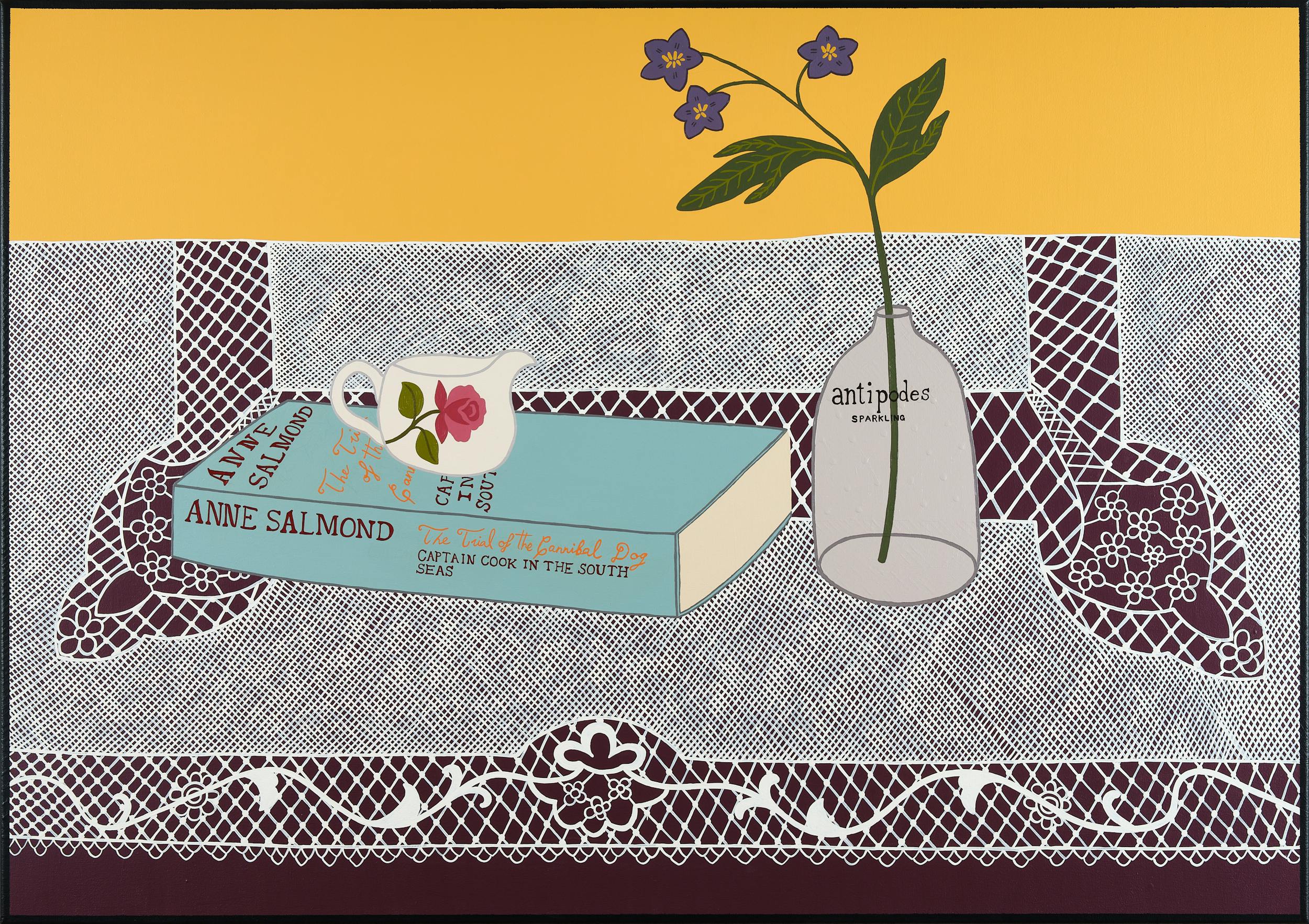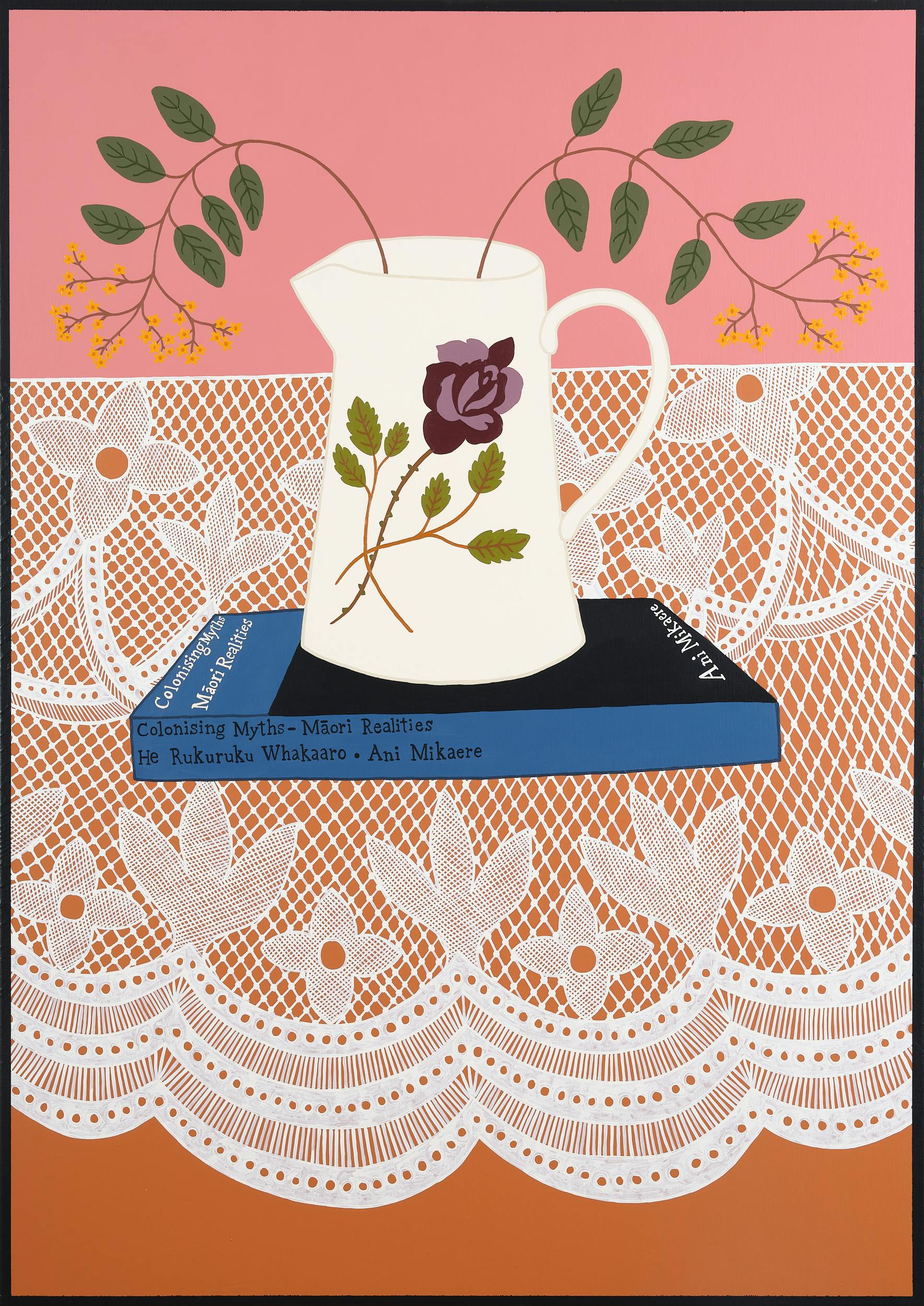
Ayesha Green, Solanum Aviculare, 2022. Acrylic on canvas. Image courtesy of the artist.
Photo Credit

Ayesha Green, Pomaderris Kumeraho, 2022. Acrylic on canvas. Image courtesy of the artist.
Photo Credit

Ayesha Green, Solanum Aviculare, 2022. Acrylic on canvas. Image courtesy of the artist.
Photo Credit

Ayesha Green, Pomaderris Kumeraho, 2022. Acrylic on canvas. Image courtesy of the artist.
Photo Credit
These new works by Ayesha Green (Ngāti Kahungunu, Kai Tahu) were produced during her recent residency at Parehuia-McCahon House. They mark a shift into still-life painting and the negotiation of the complex conventions of this historic genre. As with all of Green’s work, these new paintings are layered with references and are mindful of the formats and genres they utilise, prompting us to consider the history and politics of representation. Many are juxtaposed with painted tributes to important texts that present various frameworks for unpacking our national narratives.
Exploring how a distinctly updated Aotearoa-based perspective might operate within this deeply European tradition, Green provides make-shift vases in the form of everyday consumer packaging to introduce local connections and a folk or pop sensibility. Combined with indigenous botanical motifs, these products come from the land and represent iconic industrial brands that have a significant presence in our national psyche. Some are synonymous with specific landscapes or resources, such as Watties with Heretaunga, L&P with Paeroa, and Speights with Ōtepoti, or bottled water with natural springs. They question how we see ourselves as a nation, and how that identity is based on our exploitation of the ecology we live within.
Ayesha Green is a contemporary Māori Artist. Born 1987 in Ōtautahi Christchurch, she lives and works in Tāmaki Makaurau, Auckland. Her work often carries a forensic approach to the use of images and objects, with embedded quotations (and quotations of quotations) causing us to consider more deeply the histories, processes and power of visual information. Through this process of translation and depiction, she also speaks to relationships, whakapapa and the stories of our connections to the landscape.
These new works by Ayesha Green (Ngāti Kahungunu, Kai Tahu) were produced during her recent residency at Parehuia-McCahon House. They mark a shift into still-life painting and the negotiation of the complex conventions of this historic genre. As with all of Green’s work, these new paintings are layered with references and are mindful of the formats and genres they utilise, prompting us to consider the history and politics of representation. Many are juxtaposed with painted tributes to important texts that present various frameworks for unpacking our national narratives.
Exploring how a distinctly updated Aotearoa-based perspective might operate within this deeply European tradition, Green provides make-shift vases in the form of everyday consumer packaging to introduce local connections and a folk or pop sensibility. Combined with indigenous botanical motifs, these products come from the land and represent iconic industrial brands that have a significant presence in our national psyche. Some are synonymous with specific landscapes or resources, such as Watties with Heretaunga, L&P with Paeroa, and Speights with Ōtepoti, or bottled water with natural springs. They question how we see ourselves as a nation, and how that identity is based on our exploitation of the ecology we live within.
Ayesha Green is a contemporary Māori Artist. Born 1987 in Ōtautahi Christchurch, she lives and works in Tāmaki Makaurau, Auckland. Her work often carries a forensic approach to the use of images and objects, with embedded quotations (and quotations of quotations) causing us to consider more deeply the histories, processes and power of visual information. Through this process of translation and depiction, she also speaks to relationships, whakapapa and the stories of our connections to the landscape.